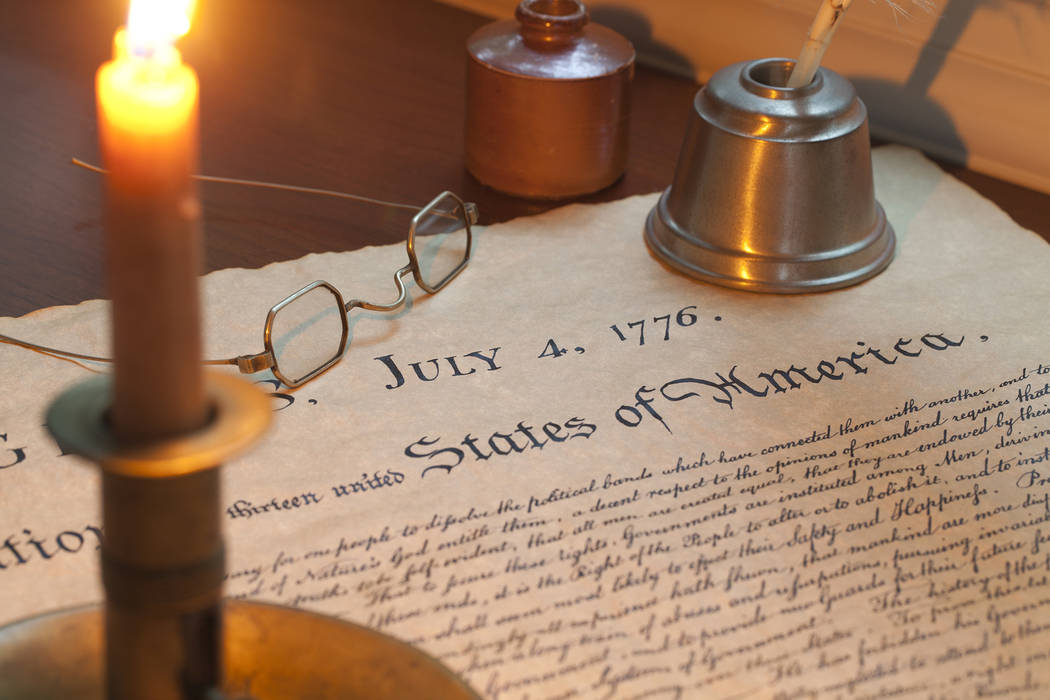Jim Hartman: Troubled country should remember first July Fourth
President Donald Trump got what he wanted for July 4 — a patriotic celebration honoring America and featuring the United States military branches with aircraft flyovers and fireworks. Trump was at the center of attention speaking from the steps of the Lincoln Memorial.
Meanwhile, Colin Kaepernick and Nike stirred controversy by pulling the scheduled release of a sneaker featuring the “Betsy Ross flag.” The Air Max 1 USA, featuring the Founding-era American flag with 13 white stars arranged in a circle to represent the original colonies, would have gone on sale to mark the Fourth of July holiday.
But Kaepernick disapproved, telling Nike he believes the flag to be an offensive symbol of oppression and slavery, dating as it does from the 1770s. Yet, no flag of the United States is a symbol of oppression and racism, and Kaepernick’s claim that the Betsy Ross flag is one — with Nike’s tacit agreement — is a political outrage based on false history.
Last year, Kaepernick signed a multi-year advertising contract with Nike worth millions of dollars annually featuring his photo bearing the words, “Believe in something. Even if it means sacrificing everything.”
The slogan refers to Kaepernick’s belief that NFL teams declined to sign him after his 2016 season, not because he played poorly (which he did) but because he knelt during the national anthem to protest police brutality against African-Americans. His collusion claim against the NFL was settled earlier this year under a confidential agreement reliably reported to be worth millions of dollars to Kaepernick as well. Far from “sacrificing everything,” Kaepernick is being richly rewarded financially through his lucrative advertising agreement with Nike and his settlement with the NFL.
Lost in the controversies of the present is any focus on the actual historical significance of July 4, our “Independence Day.” From the events of July 4, 1776, we should learn what “sacrificing everything” really means. It was on that day that Thomas Jefferson’s Declaration of Independence was adopted by the second Continental Congress. Fifty-six members of the Congress signed the Declaration. To sign was treason.
After that, the lives of these uncommon men — from business and the professions — were never quite the same again. They were politically committed.
The Declaration that they signed had pledged “our lives, our fortunes, and our sacred honor.” The penalty, if captured, was death.
Carter Braxton of Virginia owned ships that were captured by the British. He sold his home and property to pay his debts, dying a pauper. Thomas Nelson’s home was commandeered by General Cornwallis for his headquarters at the battle of Yorktown. The house was destroyed by artillery fire, and Nelson died bankrupt.
Declaration signers Hart, Norris and Livingston had to flee when their homes and fields were laid waste. Hunted and separated from their wives and families, they died of heartbreak and exhaustion.
Signers Lewis, McKean, Ellery, Clymer, Hall, Walton, Gwinnett, Heyward, Rutledge and Middleton were driven from their homes and their property looted. Five signers were captured as traitors and tortured before they died. Nine of the 56 signers fought and died from the wounds or hardships of the War of Independence.
And a new nation was born—and it has thrived. Over the span of 243 years, it has been (in Abraham Lincoln’s words) “The last, best hope of Earth.” In years of trouble, patriotic Americans have always stepped forward to save the republic, to strengthen the United States.
Now our very divided country is again in trouble. And the question is: What are we willing to do about it. What do we want to pledge?
Jim Hartman is an attorney residing in Genoa, Nevada.


















